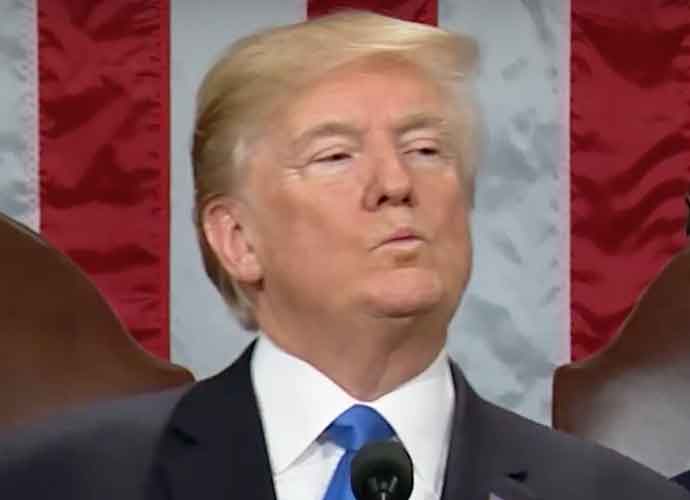

Donald Trump
Robert Mueller and the special counsel determined ten possible instances of President Donald Trump attempting to obstruct justice and outlined them in their report. Mueller did not conclude Trump was guilty of the charge, however, nor did he exonerate the president of wrongdoing.
Michael Flynn was Trump’s national security advisor until Trump fired him in February 2017. Trump initially claimed he fired Flynn for lying to Vice President Mike Pence, and he later tweeted that he also let Flynn go because he lied to the FBI. According to Mueller’s report, on February 14, 2017, Trump had said to an advisor, “Now that we fired Flynn, the Russia thing is over.” Flynn pled guilty to lying to the FBI in December of that year to Mueller.
SLIDESHOW: TOP DEMOCRATS RUNNING FOR PRESIDENT IN 2020
Mueller also references the January 2017 meeting where Trump asked then-FBI director James Comey for loyalty and a meeting the following month where Trump told Comey he hoped Comey would “see [Comey’s] way clear to letting this go, to letting Flynn go.”
Subscribe to our free weekly newsletter!
A week of political news in your in-box.
We find the news you need to know, so you don't have to.
In March 2017, Trump had asked then-White House counsel Don McGahn to ask now-former Attorney General Jeff Sessions not to recuse himself from the Russia probe. That same month, Trump had also asked Mike Pompeo, the director of national intelligence and CIA chief at the time, about how the notion of a Trump-Russia connection could be publicly refuted.
Trump terminated Comey on May 9, 2017, which Mueller notes was done before Trump heard the Justice Department’s recommendation. Trump “told Russian officials that he had faced ‘great pressure because of Russia,’ which had been ‘taken off’ by Comey’s firing” a few days afterwards. Trump had also admitted to NBC in an interview that “this Russia thing” was on his mind when he fired Comey.
News of the special counsel’s appointment seemed to inspire dread in the president, with him telling an aide how it would lead to “the end of his presidency.” Trump had also contested that Mueller had conflicts of interest and therefore should not serve as head of the probe. The commandeer in chief also asked McGahn in June 2017 to terminate the special counsel, something he refused to do.
In June 2017, Trump requested his former campaign manager Corey Lewandowski to get Sessions to publicly attack the creditability of Mueller’s probe in a statement, calling it “very unfair.” Instead, Lewandowski passed on the message to another White House staffer who neglected to deliver it to Sessions.
Trump attempted to prevent information from spreading about the now infamous June 2016 Trump Tower meeting, where a Russian lawyer promised Trump officials damaging information on rival Hillary Clinton. Trump repeatedly informed his aides not to reveal any emails concerning the meeting, and informed Donald Trump Jr. that the meeting’s true nature revolved around Russian adoption polices.
Sessions was frequently asked by Trump about the Russia probe and other possible probes into Trump’s political rivals. Sometime during the summer of 2017, Trump called Sessions at his home asking him to un-recuse himself from the investigation, and that October had asked his attorney general “take [a] look” into investigation Clinton. Trump also had suggested to Sessions that he’d be a “hero” if he assumed control of Mueller’s investigation in December, shortly after Flynn’s guilty plea.
Trump asked White House staffers to direct McGahn to deny a New York Times report, which claimed Trump asked McGahn to remove Mueller. McGahn had previously stated that the reports were accurate, spurring Trump to make his request.
Flynn’s lawyer initially had a joint defense agreement with Trump’s legal team but later terminated the deal. This caused Trump’s lawyers to tell Flynn’s that “he would make sure that the President knew that Flynn’s actions reflected ‘hostility.” Trump also initially praised Paul Manafort during his trial and implied “flipping” to work with prosecutors “almost ought to be outlawed.” Trump also expressed questionable conduct with a third individual, whose name was redacted due to an ongoing investigation.
Micheal Cohen was Trump’s longtime friend, lawyer and “fixer.” However, Trump’s attitude toward his former employee became increasingly hostile following Cohen’s decision to work with federal prosecutors, with him “publicly criticize [Cohen], called him a ‘rat,’ and suggested that his family members had committed crimes,” Mueller noted.
According to Mueller’s report, Cohen continued to maintain something of a relationship with Trump during some of his legal troubles and provided falsified information. Cohen also reportedly had asked Trump for a pardon at one point, something he denied during his testimony before Congress earlier this year.
President Donald Trump and billionaire Elon Musk have broken off their relationship following Musk’s recent…
https://youtu.be/uheUeO_OkYk Rep. Sarah McBride (D-Delaware) discussed her long road to becoming the nation's first transgender…
Following the recent Russian attacks on Ukraine, President Donald Trump criticized Russian President Vladimir Putin…
On May 28, the U.S. Department of Health and Human Services (HHS) canceled a $590…
An online feud between President Donald Trump and Elon Musk on their digital platforms on…
FDA Commissioner Dr. Marty Makary voiced skepticism about previous federal Covid-19 vaccine recommendations. "We believe…